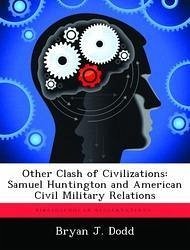The quality of the relationship between military commanders, senior government officials, and the head of state greatly influences the effectiveness of military force employment. Samuel Huntington explored this phenomenon, among others, in his seminal work, The Soldier and the State, and in the fifty-five years since its publication, history has given numerous new examples with which to test his ideas about executive civil-military relations. This work examines three American civil-military relationships using two frameworks presented by Huntington. Huntington's frames illustrate more clearly how the relationships in these three presidential administrations--Wilson, Truman, and Johnson--functioned and how the level of functionality influenced the prosecution of a war. The first framework consists of the three types of civil military relationships - balanced pattern, coordinated scheme and vertical pattern. The second framework is the patterns of civil-military relations. He addresses five combinations of three variables to explain these patterns. The three variables are political ideology, level of military political power and level of military professionalism. Huntington does not explicitly detail a correlation between these two frameworks; however, this work will explore their association to determine why problems existed and what actions can establish a more effective civil-military relationship. Additionally, an exploration of the backgrounds and experiences of the individuals involved attempts to determine if there is any correlation between their past and the effectiveness of their executive-level relationships. Although Huntington considers the balanced type of civil-military relationship the most effective, the Constitution poorly positions military leaders to influence the construct directly. Military leaders can have the greatest influence, albeit indirectly, through the behaviors defining Huntington's patterns - political ideology, level of military poli
Hinweis: Dieser Artikel kann nur an eine deutsche Lieferadresse ausgeliefert werden.
Hinweis: Dieser Artikel kann nur an eine deutsche Lieferadresse ausgeliefert werden.








